|
|
|
Sort Order |
|
|
|
Items / Page
|
|
|
|
|
|
|
| Srl | Item |
| 1 |
ID:
172430
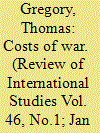

|
|
|
|
|
| Summary/Abstract |
Coalition forces have spent upwards of $50 million on condolence payments to Afghan and Iraqi civilians. These condolence payments were intended as an expression of sympathy rather than an admission of fault, and the programme itself has been criticised for the arbitrary, inconsistent, and low valuation of civilian lives. Rather than focus on the practical problems associated with condolence payments or normative arguments about whether belligerents ought to compensate those harmed, this article will trace the strategic imperatives that underpinned this programme and shaped its development. As coalition forces began to recognise the strategic costs of civilian casualties, they used a variety of tactics to mitigate the effects of civilian casualties on the success of military operations. This article will argue that condolence payments should not be seen as a humanitarian gesture designed to recognise and respond to the suffering of ordinary civilians, but will argue that condolence payments should be viewed as a weapons system aimed at securing specific military goals. As such, this article will argue that condolence payments continued to objectify and devalue the lives of Afghans and Iraqis by treating them as a means to an end rather than an end in themselves.
|
|
|
|
|
|
|
|
|
|
|
|
|
|
|
|
| 2 |
ID:
172426
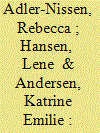

|
|
|
|
|
| Summary/Abstract |
How are images, emotions, and international politics connected? This article develops a theoretical framework contributing to visuality and emotions research in International Relations. Correcting the understanding that images cause particular emotional responses, this article claims that emotionally laden responses to images should be seen as performed in foreign policy discourses. We theorise images as objects of interpretation and contestation, and emotions as socially constituted rather than as individual ‘inner states’. Emotional bundling – the coupling of different emotions in discourse – helps constitute political subjectivities that both politicise and depoliticise. Through emotional bundling political leaders express their experiences of feelings shared by all humans, and simultaneously articulate themselves in authoritative and gendered subject positions such as ‘the father’. We illustrate the value of our framework by analysing the photographs of Alan Kurdi, a three-year-old Syrian-Kurdish boy who drowned in September 2015. ‘Kurdi’ became an instant global icon of the Syrian refugee crisis. World leaders expressed their personal grief and determination to act, but within a year, policies adopted with direct reference to Kurdi's tragic death changed from an open-door approach to attempts to stop refugees from arriving. A discursive-performative approach opens up new avenues for research on visuality, emotionality, and world politics.
|
|
|
|
|
|
|
|
|
|
|
|
|
|
|
|
| 3 |
ID:
172423


|
|
|
|
|
| Summary/Abstract |
Ideational variables have frequently been employed in positivist-minded and materialist analyses of state behaviour. Almost inevitably, because of these commitments, such studies run into theoretical challenges relating to the use of ideas. In this article, I suggest that integrating ideational factors in positivist and materialist approaches to state behaviour requires: (1) distinguishing conceptually between interests and ideation as well as between individual beliefs and social ideas; and (2) addressing challenges of operationalisation and measurability. To that end, I employ neoclassical realism as a case study. I argue that a re-conceptualisation of ideas as externalised individual beliefs employed in political deliberation allows neoclassical realists to focus on how ideas and ideational competition intervene in the transmission belt from materially given interests to foreign policy choice. At the same time, it more clearly operationalises ideas as identifiable in language and communication. I suggest this reconceptualisation, while consistent with realist paradigmatic assumptions, need not be limited to neoclassical realism. Instead, transposed to different paradigms, it would similarly allow positivist-minded constructivists and institutionalists to avoid a conceptually and methodologically awkward equation of different ideational factors.
|
|
|
|
|
|
|
|
|
|
|
|
|
|
|
|
| 4 |
ID:
172425
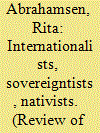

|
|
|
|
|
| Summary/Abstract |
Contrary to common assumptions that the liberal world order was ‘made in the West’, this article argues that it was produced in interaction with Pan-African ideology and actors. Developing a morphological analysis, it identifies three contending visions of world order within Pan-Africanism: a world of continental unity and transnational solidarity; a world of national sovereignty; and a world of racially defined units. It concludes that Pan-Africanism contains intellectual and political resources for the defence, reinvigoration, and invention of a more just, equal and rule-bound multilateral world, but that this cannot be taken for granted. Pan-Africanism is neither inherently progressive, nor reactionary, and can support multilateralism and sovereigntism in equal measure. Pan-Africanism's nativism also carries particular risks at a time when similar identitarian viewpoints are promoted by Radical Right movements. Understanding the manner in which Pan-Africanism informs and legitimises diverse political agendas is thus of crucial importance for IR, for Pan-Africanists, and for the future of world order.
|
|
|
|
|
|
|
|
|
|
|
|
|
|
|
|
| 5 |
ID:
172422


|
|
|
|
|
| Summary/Abstract |
Time constitutes social life and time management is central to the everyday conduct of international politics. For some reason, however, the practice turn in International Relations (IR) has produced knowledge about how past practices constitute international politics but not about how the future is also a constitutive feature in and on social life. Introducing a novel perspective on practice and temporality, the article argues that intersubjectively situated representations of the future by practitioners in international politics contribute substantially to our understanding of political processes and the making of international politics. To develop what appears a contradiction in terms – that ‘future-practices’ are driven by tacit know-how and conscious reflection simultaneously – the article develops the concept of doxic futures: representations of the future rooted in practical knowledge and tacit assumptions about the self-evident nature of the social world. The argument is illustrated with a case study of European security and defence diplomacy after the UK voted to leave the EU. Through the envisioning of two concrete doxic futures, a ‘Europe of buying together’ and the UK as a third country in EU defence, diplomats effectively tried to save European security and defence cooperation from the potentially disintegrating effects of Brexit.
|
|
|
|
|
|
|
|
|
|
|
|
|
|
|
|
| 6 |
ID:
172427


|
|
|
|
|
| Summary/Abstract |
The persistence and strength of international norms are thought to depend partly on the willingness of actors to punish their violation, but norm enforcement is often inconsistent. This article investigates states’ use of economic sanctions in order to gain insight into the role of metanorms (norms about enforcing norms) in international politics and explain this inconsistency. The quantitative analyses examine patterns of economic sanctions and arms embargo practices across different security norms and reveal two central findings. First, international metanorms may accommodate important interstate relationships. Although severe human rights abuse, conflict, nuclear weapons development, and support for terrorist organisations tend to attract sanctions, they are infrequent in comparison with norm violations. Valued relationships between senders and targets seem to be an accepted limit to the pursuit of costly norm enforcement. Second, norm violations nevertheless remain rare, suggesting that factors other than the prospect of material punishment may encourage compliance. Indeed, by preserving interstate relationships, international metanorms may facilitate the engagement needed for socialisation and social pressures as alternative compliance mechanisms.
|
|
|
|
|
|
|
|
|
|
|
|
|
|
|
|
| 7 |
ID:
172429
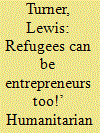

|
|
|
|
|
| Summary/Abstract |
In the context of a greater focus on the politics of migration, the ‘refugee entrepreneur’ has become an increasingly important figure in humanitarian, media, and academic portrayals of refugees. Through a focus on Jordan's Za‘tari refugee camp, which has been deemed a showcase for refugees’ ‘entrepreneurship’, this article argues that the designation of Syrian refugees as ‘entrepreneurs’ is a positioning of Syrians within colonial hierarchies of race that pervade humanitarian work. For many humanitarian workers in Jordan, Syrians' ‘entrepreneurship’ distinguishes them from ‘African’ refugees, who are imagined as passive, impoverished, and dependent on humanitarian largesse. Without explicit racial comparisons, humanitarian agencies simultaneously market Syrian refugees online as ‘entrepreneurs’, to enable them to be perceived as closer to whiteness, and to thereby render them more acceptable to Western audiences and donors, who are imagined as white. This article extends scholarly understandings of the understudied relationship between race and humanitarianism. Furthermore, it asks critical questions about the political work and effects of vision of the ‘refugee entrepreneur’, which it locates within the context of the increasingly neoliberalised refugee regime. ‘Refugee entrepreneurs’ do not need political support and solidarity, but to be allowed to embrace the forces of free-market capitalism.
|
|
|
|
|
|
|
|
|
|
|
|
|
|
|
|
| 8 |
ID:
172428
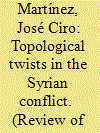

|
|
|
|
|
| Summary/Abstract |
This article seeks to question the epistemological monopoly of territory and scale in analyses of the Syrian conflict. It does so to both challenge static conceptualisations of space in the study of politics and analyse how seemingly remote actors influence wartime outcomes. Since 2011, NGOs, government bodies, and merchants have worked to connect Damascus to Tehran, Idlib to Istanbul, London to Dara‘a. These connections have proven crucial to the reliable supply of food, funds, and firepower. Yet rather than reveal the importance of foreign patrons or proxies on the ground, such dynamics speak to a world in which relationships matter more than distance, practices more than geopolitical position or a priori forms of alliance. Drawing on the work of John Allen, I suggest why thinking topologically about these dynamics better equips us to understand the political outcomes they help engender. To demonstrate the promise of this approach, I hone in on the partnerships, intermediaries, and connections that shape performances of political authority in Syria by examining one object crucial to its enactment: bread.
|
|
|
|
|
|
|
|
|
|
|
|
|
|
|
|
| 9 |
ID:
172424
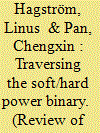

|
|
|
|
|
| Summary/Abstract |
Soft power and hard power are conceptualised in International Relations as empirically and normatively dichotomous, and practically opposite – one intangible, attractive, and legitimate, the other tangible, coercive, and less legitimate. This article critiques this binary conceptualisation, arguing that it is discursively constructed with and for the construction of Self and Other. It further demonstrates that practices commonly labelled and understood as soft power and hard power are closely interconnected. Best understood as ‘representational force’ and ‘physical force’ respectively, soft and hard power intertwine through the operation of productive and disciplinary forms of power. We illustrate this argument by analysing the Sino-Japanese dispute over the Diaoyu/Senkaku Islands. Both governments exercise representational force in constructing their respective versions of events and Self/Other. The soft/hard power binary itself plays a performative role as the Self is typically associated with soft power and the Other with hard power. The operation of productive power, moreover, privileges the attractiveness of the former and the repellence of the latter, and disciplinary power physically enforces these distinctions on subjects in both states. Finally, reinforced Self/Other distinctions legitimise preparations for violence against the Other on both sides, thus exposing how fundamentally entangled soft and hard power are in practice.
|
|
|
|
|
|
|
|
|
|
|
|
|
|
|
|
|
|
|
|
|